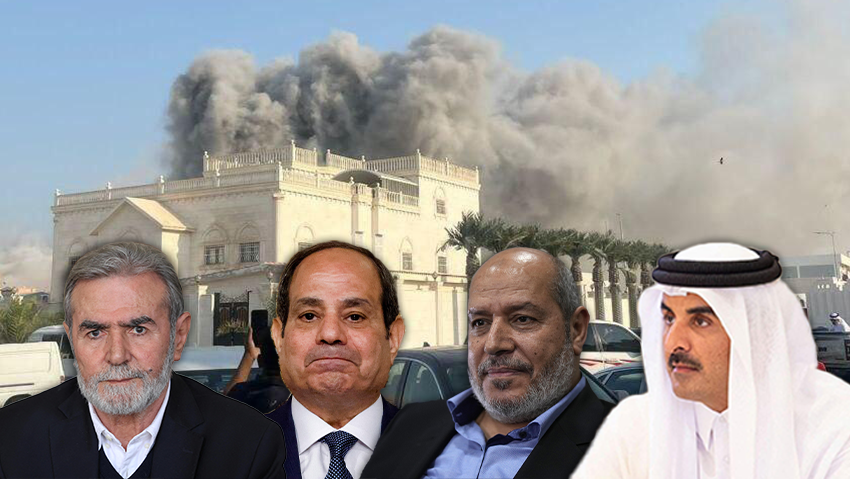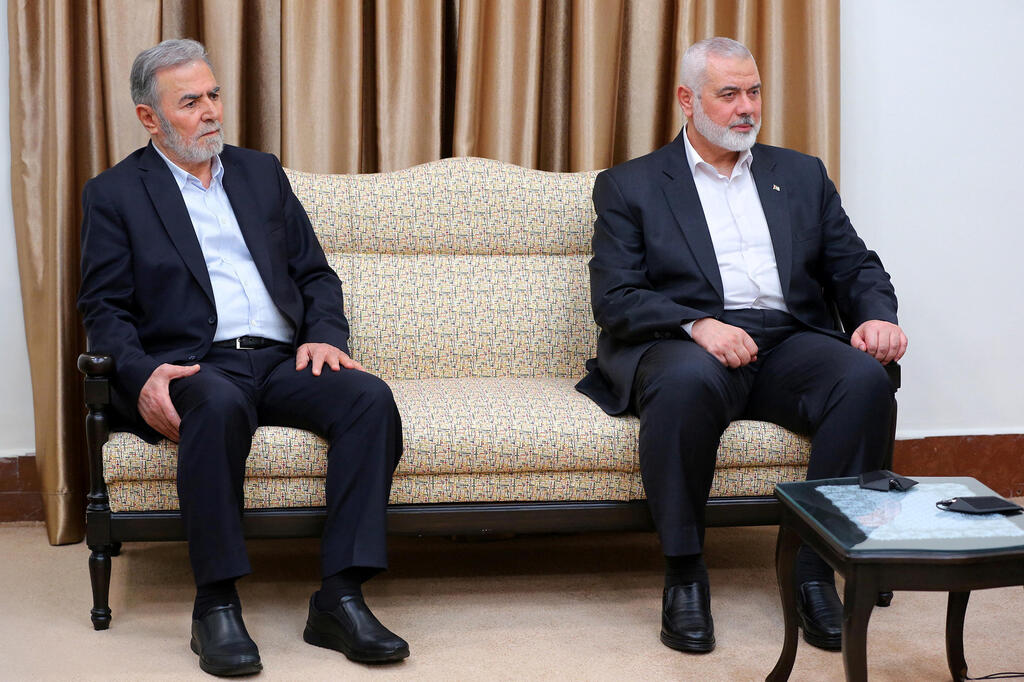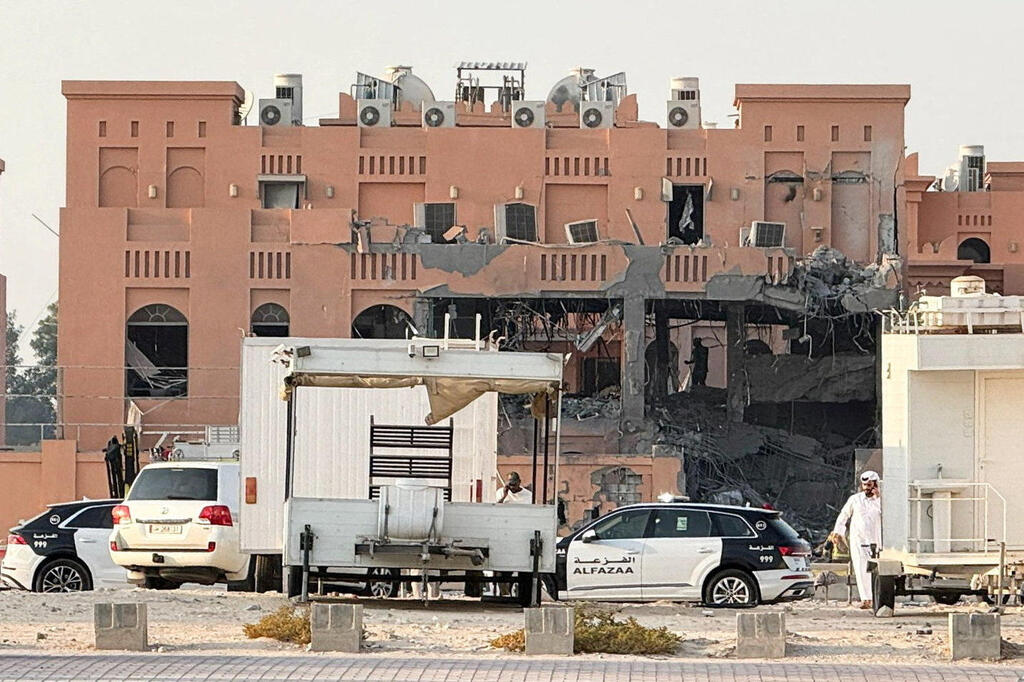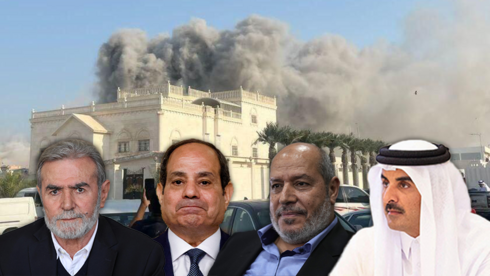Among the most prominent names is Ziyad al-Nakhalah, secretary-general of Palestinian Islamic Jihad, alongside Palestinians freed in hostage-prisoner deals who were later relocated to Egypt under special residency arrangements.
3 View gallery


Qatar’s Emir Tamim bin Hamad Al-Thani; Egyptian President Abdel Fattah el-Sisi; Islamic Jihad leader Ziyad al-Nakhalah; and Hamas Gaza leader Khalil al-Hayya
(Photo: Khalil Hamra/AP, Majid Asgaripour / Reuters)
The Egyptian backing is not limited to Islamic Jihad. The Popular Front for the Liberation of Palestine, a Marxist-Leninist faction, has also shifted its leadership activities to Cairo, with its officials now under the direct protection of Egyptian intelligence. This marks a deep shift in Cairo’s policy—from that of a relatively neutral mediator to that of a host state granting security cover, a role once associated with Damascus and Tehran.
Ziyad al-Nakhalah’s rise
Al-Nakhalah, 72, born in Khan Younis in Gaza, is today considered one of the most influential figures in Palestinian politics. He has served as secretary-general of Islamic Jihad since 2018, following the death of his predecessor, Ramadan Shalah.
In 1971, he was arrested by Israel and sentenced to life in prison for his activity with the Arab Liberation Front. He was released in the 1985 Jibril prisoner swap, which freed more than 1,100 Palestinian inmates, and was soon appointed by Fathi al-Shikaki to establish the group’s military wing, the al-Quds Brigades.
In 1988, al-Nakhalah was arrested again for his role in leading the First Intifada. That same year he was deported to Lebanon, where he deepened his ties with Iran and Hezbollah, becoming a key architect of the strategic alliance between Tehran and Palestinian armed factions. Although he maintains close relations with Hamas, al-Nakhalah insists on preserving his group’s independent identity and pursues an even more hardline stance against Israel.
3 View gallery


Iran’s Supreme Leader Ayatollah Ali Khamenei meets with Hamas leader Ismail Haniyeh and Islamic Jihad leader Ziyad al-Nakhalah in Tehran
(Photo: Office of the Iranian Supreme Leader/WANA (West Asia News Agency) via REUTERS)
Israel currently ranks al-Nakhalah as its third most important target for assassination, after Hamas’ top leaders. The United States also designates him as a “specially designated global terrorist,” with the Treasury Department offering millions of dollars for information leading to his capture.
Palestinian sources said Egypt’s sponsorship of al-Nakhalah and other faction leaders sends a dual message: To Israel and the U.S., that any attack on Egyptian soil would be considered a grave violation of sovereignty; and to Palestinians, that Egypt is no longer merely a mediator but a protector, offering security cover for the most senior leaders of the “resistance.”
The Doha strike
Meanwhile, uncertainty lingers after the strike in Doha that aimed to decapitate Hamas’ overseas leadership but is widely believed to have failed. The primary target was senior Hamas leader Khalil al-Hayya, whose son was killed. Hamas claimed he survived, though it has not released any photos or proof.
According to reporting by Israeli journalist Ronen Bergman in Yedioth Ahronoth, Qatari officials have imposed strict information-security measures, barring even basic details about casualties. Two Gulf sources familiar with events in Doha told him that Hamas leaders are being kept inside a heavily secured Qatari compound with no phones or communication devices, forbidden from contact with the outside world.
Although Israel has not formally labeled the strike a failure, officials remain unsure of its impact on ongoing mediation efforts for a hostage deal. The uncertainty comes even after Qatari Prime Minister Mohammed al-Thani met President Donald Trump in New York this week.
3 View gallery


The aftermath of the strike in Doha
(Photo: REUTERS/Ibraheem Abu Mustafa)
Some in Israel’s security establishment argue that the crisis could be leveraged to shift mediation leadership from Qatar to Egypt, which has long competed with Doha for influence over Palestinian affairs. “The strike in Doha created a shockwave that we may be able to turn to our advantage,” an Israeli defense official said. “Within a week we’ll know if the potential is good or bad.”
Defense officials hope clarity will come after U.S. Secretary of State Marco Rubio’s visit to Israel today.
Prime Minister Benjamin Netanyahu signaled Wednesday night that Israel has not abandoned its goal of eliminating Hamas’ leadership, wherever they may be hiding. Writing in English on X, formerly Twitter, he said: “They don’t care about the people in Gaza. They blocked every attempt at a cease-fire to drag the war endlessly. Removing them will eliminate the main obstacle to freeing the hostages and ending the war.”

